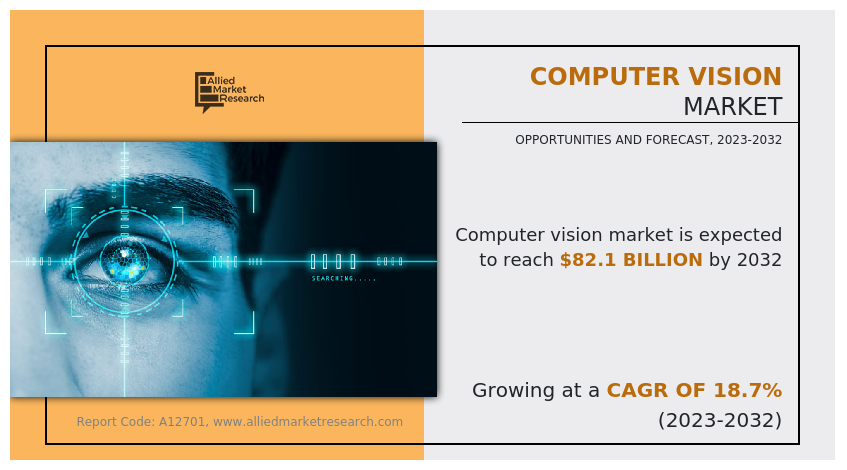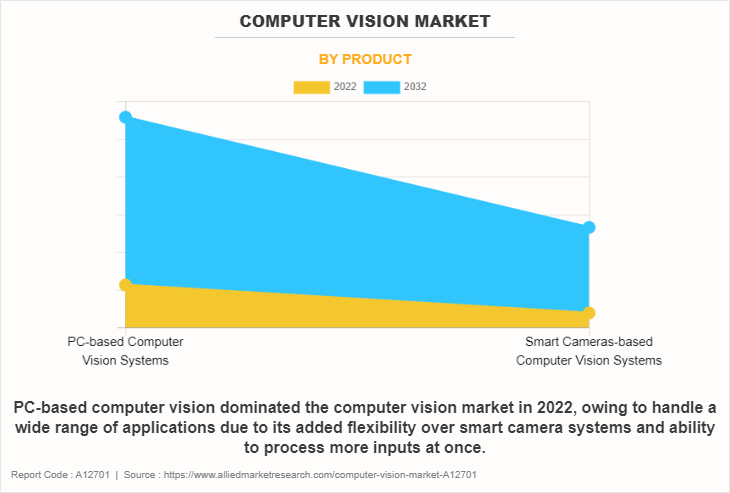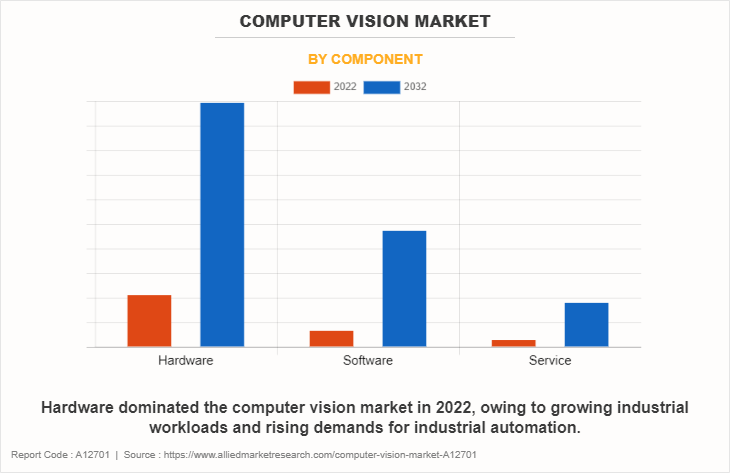Computer Vision Market Insights, 2032
The global computer vision market size was valued at USD 15 billion in 2022, and is projected to reach USD 82.1 billion by 2032, growing at a CAGR of 18.7% from 2023 to 2032.
Surge in increased processing and better accuracy coupled with economic advantage of computer vision system are one of the major factors that is striking the market growth during the forecast period. However, intense requirement of highly skilled and experienced professional and user data privacy and safety concerns is primarily restraining the market growth. Moreover, growing application of computer vision in non-industrial applications and advancements in the field of computer vision and AI vision market is expected to create a lucrative opportunity for the market growth during the forecast period.

A computer vision system acquires, processes, and analyses real-world images in order to produce numerical or symbolic information, often in the form of a decision. Each application requires a specialized adaptation and enhancement to the computer vision algorithm, although several fundamental blocks of algorithms are common. Computer vision is the enterprise of automating and integrating a wide range of processes and representations used for visual perception. It includes many techniques that are useful by themselves, such as image processing (transforming, encoding, and transmitting images) and statistical pattern classification (statistical decision theory applied to general patterns, visual or otherwise). Following the current trend of automation and 3D imaging in all major industries, the market for computer vision and also in AI vision market is expected to witness growth at a high rate in the near future.
The global computer vision market is segmented on the basis of components, product, application, end user and region. On the basis of component, it is divided into hardware, software and services. On the basis of product, it is bifurcated into PC based and smart camera based computer vision system. On the basis of application, it is divided into quality assurance & inspection, positioning & guidance, measurement, identification, predictive maintenance. On the basis of end user, it is fragmented into industrial and non-industrial. On the basis of region, it is analyzed across North America, Europe, Asia-Pacific, and LAMEA.
The market players operating in the computer vision industry are Intel Corporation, Texas Instruments Incorporated, Cognex Corporation, Keyence Corporation, Sony Corporation, Basler AG, Omron Corporation., Mediatek Inc., National Instruments Corporation, Teledyne Technologies Incorporate. These major players have adopted various key development strategies such as business expansion, new product launches, and partnerships, which help to drive the growth of the computer vision industry globally.

On the basis of product, PC-based computer vision systems segment dominated the computer vision market in 2022 and is expected to maintain its dominance in the upcoming years, owing to handle a wide range of applications due to its added flexibility over smart camera systems and ability to process more inputs at once propels the market growth significantly. However, the smart cameras-based computer vision systems segment is expected to witness the highest growth during the computer vision market forecast, owing to perform some predefined function/tasks and is designed according to the needs of that particular task.

On the basis of component, hardware segment dominated the computer vision market in 2022 and is expected to maintain its dominance in the upcoming years owing to growing industrial workloads and rising demands for industrial automation propels the market growth significantly. However, the software segment is expected to witness the highest growth, owing to offer custom image processing applications such as facial detection, object identification, text recognition, color, and pattern recognition, and others.
Top Impacting Factors
Faster Processing and Better Accuracy
With the adoption of computer vision systems, organizations and businesses can have their simple repetitive tasks performed through an automated system, which otherwise can be time consuming when performed manually. For instance, as per a study published in IEEE Transactions on Intelligent Transportation Systems, computer vision powered traffic detection and monitoring system were found to be over 91% more reliable than traditional human-powered systems. This gives computer vision systems a fair advantage, thereby influencing larger investments to develop more applications based on computer vision.
Moreover, computer vision powered systems are faster than their human counterparts, thereby resulting in high usage, specifically within the industrial sector. For instance, manufacturing plants can use high-speed cameras powered by computer vision to detect anomalies on the product line while processing more than hundreds of products and variables in just a few seconds. Thus, with such high performance factors, computer vision system is gaining a rapid progression, thereby boosting the market computer vision growth.
Economic Advantage of Computer Vision System
Computer vision and machine learning-powered systems are overall more economical than manual legacy systems. Moreover, computer vision systems can perform repetitive tasks with minimal error probability, while humans are more prone to commit mistakes that can cause complete system shutdown and have serious financial and social consequences for the organization or the business. As per a study conducted by AMR, machine learning can train with larger datasets and have over 90% more accuracy than human based systems. These factors promise computer vision systems market to grow as more applications develop based on them in the future.
Regional Insights
The computer vision market is experiencing significant growth across various regions, driven by advancements in artificial intelligence (AI), machine learning (ML), and image processing technologies. Computer vision is being increasingly adopted across industries such as healthcare, automotive, retail, and manufacturing for applications including automation, facial recognition, and robotics. Below are regional insights and key developments within the market:
1. North America
North America holds a dominant position in the computer vision market due to the strong presence of leading technology companies like Nvidia, Intel, and Google, which are investing heavily in AI and computer vision technologies. The U.S. government has also shown interest in funding AI and machine vision research, driving innovation across sectors. Key developments in the region include the growing adoption of computer vision in autonomous vehicles, with companies like Tesla and Waymo leading the way. Retailers like Amazon and Walmart are leveraging computer vision for cashier-less stores and automated checkout systems, enhancing the shopping experience. Additionally, computer vision is playing a pivotal role in healthcare, where it is used in medical imaging for disease diagnosis and treatment planning.
2. Europe
Europe is a major player in the computer vision market, with significant contributions from countries like Germany, France, and the UK. The region’s strong automotive industry is driving demand for computer vision, especially in the development of advanced driver-assistance systems (ADAS) and autonomous driving technologies. For example, BMW and Daimler are using computer vision to enhance vehicle safety and navigation. The European Union’s focus on Industry 4.0 and smart manufacturing is also fueling the adoption of computer vision for quality control and process automation in manufacturing plants. In healthcare, companies like Siemens Healthineers are utilizing computer vision for precise medical imaging and diagnostics. Additionally, regulatory frameworks like GDPR are influencing the development of computer vision technologies with an emphasis on data privacy.
3. Asia-Pacific
Asia-Pacific is experiencing rapid growth in the computer vision market, primarily driven by advancements in China, Japan, and South Korea. China, in particular, is a leader in facial recognition technology, with companies like SenseTime and Megvii providing large-scale surveillance and security solutions. The Chinese government’s focus on smart city projects and AI research has propelled the development of computer vision in public security, traffic management, and urban planning. In Japan and South Korea, computer vision is being integrated into robotics, a key part of their respective manufacturing industries. Additionally, the rise of e-commerce in the region has led to increased use of computer vision in retail for personalized shopping experiences, inventory management, and fraud detection.
Key Industry Developments
- For instance, in August 2022, TachyHealth, Inc, a Dubai-based artificial intelligence solution provider for medical centers and hospitals, collaborated with Medical Refill, which provides remote medical consultation for their patients. The collaboration aims to provide technology solutions such as computer vision, artificial intelligence, and big data analytics to the clinical team. Further, it would help them quickly transform the complex laboratory results from PDF or image format to a text format that would improve patient engagement and make it more interactive in their treatment journey.
- For instance, in July 2022, IDEMIA, a multinational technology company that offers facial recognition and other computer vision software & products to government and private companies, partnered with the U.S. Department of Homeland Security which takes care of public security in the U.S. The partnership is expected to improve U.S. Department of Homeland Security activities such as identifying suspects during criminal investigations & travelers at the airports and streamlining security at the checkpoints after deploying facial recognition tools.
- For instance, in May 2021, Aventior, Inc., a technology service provider, stated in its article that computer vision technology is making self-driving cars safe for passengers. The facial recognition tool, which is used with sensor technology, would quickly help identify cars, people, and other objects on the road. Further, computer vision technology would help self-driving vehicles become more intelligent and reliable. It helps to create a 3D map by capturing real-time images, quickly identifying low light conditions with the help of their algorithms and can also easily recognize objects using HDR and LIDAR sensors.
- For instance, in March 2021, Amazon Web Services, Inc., a provider of cloud computing platforms, launched "Amazon Lookout," a vision service for inspecting products in manufacturing. By reducing obstacles in designing, fine-tuning computer vision models, training, monitoring, and deploying, Amazon Lookout aims to make it accessible to many more manufacturing units. Further, it would help its clients to deploy computer vision into its operating systems within their facilities.
Key Benefits for Stakeholders
- This report provides a quantitative analysis of the market size, market segments, current trends, estimations, and dynamics of the computer vision market analysis from 2022 to 2032 to identify the prevailing computer vision market opportunities.
- The market research is offered along with information related to key drivers, restraints, and opportunities.
- Porter's five forces analysis highlights the potency of buyers and suppliers to enable stakeholders make profit-oriented business decisions and strengthen their supplier-buyer network.
- In-depth analysis of the computer vision market segmentation assists to determine the prevailing market opportunities.
- Major countries in each region are mapped according to their revenue contribution to the global market by computer vision market share.
- Market player positioning facilitates benchmarking and provides a clear understanding of the present position of the market players.
- The report includes the analysis of the regional as well as global computer vision market trends, key players, market segments, application areas, and computer vision market growth strategies.
Computer Vision Market Report Highlights
| Aspects | Details |
| Market Size By 2032 | USD 82.1 billion |
| Growth Rate | CAGR of 18.7% |
| Forecast period | 2022 - 2032 |
| Report Pages | 349 |
| By Product |
|
| By Application |
|
| By End User |
|
| By Component |
|
| By Region |
|
| Key Market Players | Sony Corporation, National Instruments Corporation, KEYENCE CORPORATION, Cognex Corporation, BASLER AG, Omron Corporation., Intel Corporation, Texas Instruments Incorporated, Teledyne Technologies Incorporated, MediaTek Inc. |
Analyst Review
The market for computer vision is developing significantly and is anticipated to continue in the upcoming years. The adoption of computer vision technology, which enables machines to visually observe and understand the world, is rising in a number of different sectors, including manufacturing, healthcare, automotive, and retail. The increasing need for automation and efficiency in businesses, developments in AI and deep learning, and the accessibility of high-performance computing systems are some of the key drivers that are fueling the demand for computer vision. Moreover, the market is also growing as a result of the expanding usage of computer vision in tasks including object detection, image segmentation, and video analytics. Additionally, the main contributor to the computer vision market is the healthcare sector, which uses the technology for a variety of purposes, including patient monitoring, surgical robotics, and medical imaging and diagnostics. Computer vision is also used in the automobile sector for projects such as driverless vehicles and advanced driver assistance systems (ADAS). Furthermore, computer vision has wide use in the retail industry for cashierless checkout systems, customer analytics, and inventory management. Computer vision is increasingly deployed in the industrial sector for process optimization, defect detection, and quality control. For instance, in February 2023, KEYENCE CORPORATION enhanced its VS series for computer vision that delivers rapid machine vision solutions for a wide range of applications at any experience level.
For instance, in March 2023, Texas Instruments Incorporated enhanced its computer vision solutions and launched six Arm Cortex based vision processors that allow designers to add more vision and artificial intelligence (AI) processing at a lower cost, and with better energy efficiency, in applications such as video doorbells, machine vision and autonomous mobile robots.
The global computer vision market size was valued at $15 billion in 2022, and is projected to reach $82.1 billion by 2032
The computer vision market is projected to grow at a compound annual growth rate of 18.7% from 2023 to 2032.
The key players that operate in the cloud gaming market such as Intel Corporation, Texas Instruments Incorporated, Cognex Corporation, Keyence Corporation, Sony Corporation, Basler AG, Omron Corporation., Mediatek Inc., Teledyne Technologies Incorporate are the top companies to hold the market share in Computer Vision
North America is the largest regional market for Computer Vision.
Surge in increased processing and better accuracy coupled with economic advantage of computer vision system are one of the major factors that is striking the market growth during the forecast period.
Loading Table Of Content...
Loading Research Methodology...



